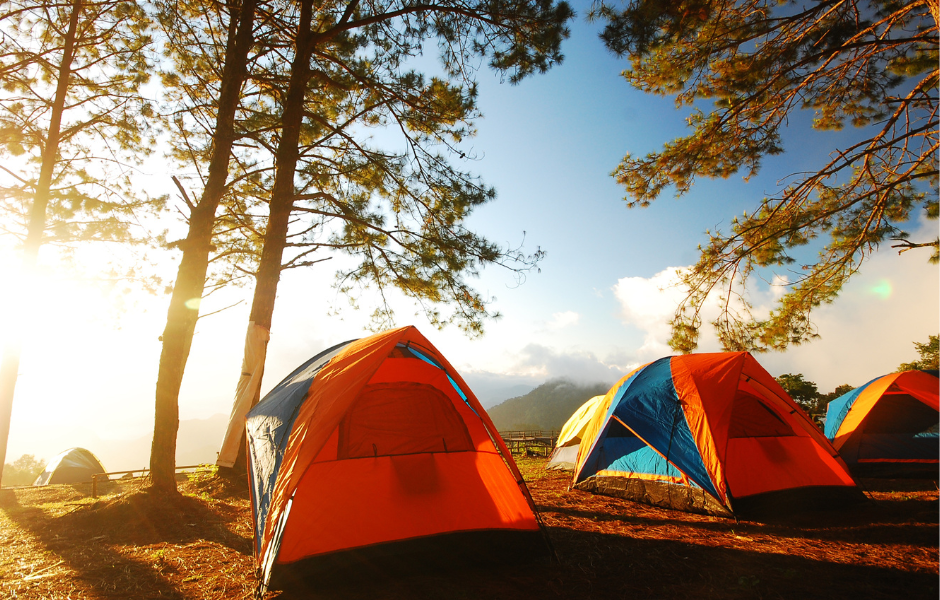Americans love to camp. It’s a summer pastime for an estimated 48 million households each year (and the numbers have been growing since the pandemic). But facing the elements can be dangerous and challenging. On average, there are more than 30,000 camping-related emergency room visits each year and another 75,000 campers are treated by doctors for their injuries.
But with some preparation, care and common sense, most camping accidents and injuries can be avoided.
Advance Planning
Like in any situation where safety is a consideration, preparation is key.
- Keep an eye on the weather forecast and make sure you have the clothing and supplies that you need for the conditions.
- Know how to set up and use your equipment before you start on your adventure. Read your manuals.
- Schedule an early arrival at your campsite so you have enough daylight to scout your location for hazards.
- Know how much food and water you will need and how to safely store your supplies.
- Create a packing list for the essentials, including a first-aid kit, flashlights, batteries, etc.
Fire Safety
Campfires play a major role in camping. From cooking food, keeping us warm and providing a common place to gather. But campfires are among the most common sources of accidents and injuries during campouts.
Here are some simple, but important rules fire safety rules to follow while you are in the great outdoors:
- When setting up your fire, make sure that there is plenty of space. Build campfires away from overhanging branches, steep slopes, rotten stumps, tents and personal belongings. Clear the area of dry grass or leaves.
- Never leave the campfire unsupervised. Even a small breeze could quickly cause a fire to spread.
- Don’t attempt to burn containers that are pressurized or made of glass or aluminum.
- Make sure to keep your fire at a manageable size and temperature. A good bed of coals or a small fire surrounded by rocks gives plenty of heat.
- When extinguishing your fire use water/dirt to put out the fire. Have a shovel for throwing dirt on the fire if it gets out of control.
- When extinguishing the fire, make sure there are no burning embers hiding under the surface.
- If the materials in an extinguished fire are still too hot to touch, it is not safe to be left alone.
Ticks and Mosquitoes
Another common outdoor hazard this time of year is ticks and mosquitoes that can carry and spread bacteria and diseases. Rocky Mountain spotted fever, Lyme disease and ehrlichiosis — all bacterial infections that can cause fever, headache, rashes, flu-like illness and other symptoms — are commonly acquired from tick bites. Meanwhile, mosquitoes can carry the West Nile virus which may sometimes cause severe illness (high fever, headache, neck stiffness, stupor, disorientation, coma, tremors, convulsions, muscle weakness, vision loss, numbness and paralysis) and even death.
Here are some tips for avoiding tick and mosquito bites:
- Choose your campsite with care. Try to set up camp in an area that is dry, cleared rather than wooded, and sunny rather than dark. Check for piles of leaf litter before pitching your tent and avoid contact with grass by bringing camping chairs instead of sitting on the ground.
- Apply bug repellent multiple times per day. The effect does wear off eventually so be sure to remember to reapply it.
- Dress defensively. Wear as much additional clothing as possible without risking overheating.
- Mind where you walk. Mosquitoes always live near still bodies of water and ticks like to linger in tall grass in hopes of latching on to anyone who passes by.
- After returning home put all your clothes in the dryer on high heat for 10 minutes before washing
Keep these tips in mind when you go out to enjoy your next camping experience. Planning ahead and taking some precautions will allow you to come back with wonderful memories rather than unpleasant injuries or illnesses.

